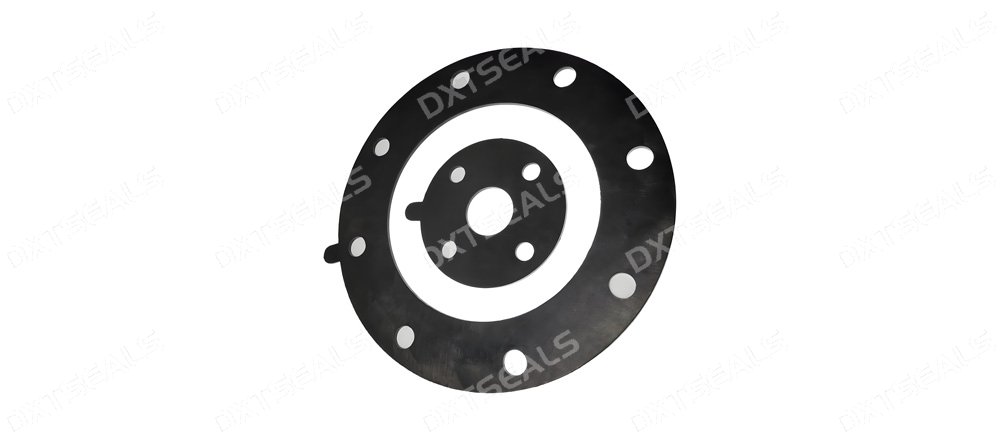Introduction
In any HVAC system, whether for residential, commercial, or industrial purposes, ensuring the integrity of your connections is crucial for efficient operation. One of the most essential components for achieving a reliable seal between the flanged connections in HVAC systems is the flange gasket. The right gasket prevents leaks, maintains pressure, and contributes to overall system efficiency. In this article, we’ll guide you through the process of selecting the best flange gasket for your HVAC system, based on the materials, applications, and specific needs of your installation.
1. What Is a Flange Gasket?
A flange gasket is a sealing element used to create a leak-proof connection between two flanged parts, such as pipes, valves, or equipment, within HVAC systems. It compensates for imperfections in the surfaces of the flanges, preventing air, water, or other fluids from escaping. By ensuring proper sealing, flange gaskets improve the energy efficiency and safety of HVAC systems.
Key Functions of Flange Gaskets in HVAC Systems:
- Leak Prevention: Prevents leakage of air, water, refrigerants, or other fluids.
- Pressure and Temperature Control: Ensures that systems operate under the correct pressure and temperature, improving performance.
- Energy Efficiency: Helps maintain system efficiency by preventing energy loss due to leaks.
- Protection from Contaminants: Keeps harmful substances from contaminating the system or environment.
2. Types of Flange Gaskets for HVAC Systems
There are several types of flange gaskets, and selecting the right one depends on the operating conditions of your HVAC system. Below are the most common types used in HVAC applications:
a. Rubber Gaskets
Rubber gaskets are commonly used in HVAC systems due to their versatility, flexibility, and cost-effectiveness. They are available in a wide range of elastomers, such as EPDM, Nitrile (NBR), and Viton, each offering different properties suited to specific conditions.
- EPDM: Excellent resistance to weathering, ozone, and UV radiation, ideal for outdoor HVAC systems.
- NBR: Provides excellent sealing in refrigeration systems where oils, gases, or refrigerants are involved.
- Viton: High resistance to chemicals and high temperatures, making it ideal for HVAC systems handling aggressive fluids.
b. PTFE Gaskets
PTFE (Polytetrafluoroethylene) gaskets are highly resistant to chemical corrosion, making them suitable for HVAC systems that deal with refrigerants, chemicals, or solvents. PTFE is also non-reactive, ensuring that it won’t contaminate the system.
c. Cork Gaskets
Cork gaskets are often used in low-pressure HVAC systems. These gaskets offer good compressibility and flexibility, making them suitable for sealing irregular surfaces.
d. Spiral Wound Gaskets
For systems with higher pressures, spiral wound gaskets made of metal and filler material offer enhanced sealing properties. They are especially effective in ensuring tight seals under fluctuating temperatures and pressures.
3. Factors to Consider When Choosing a Flange Gasket for Your HVAC System
Selecting the best flange gasket for your HVAC system depends on several key factors. Here’s a checklist to guide your decision:
a. Temperature Resistance
HVAC systems operate in a range of temperatures, from freezing cold to high heat. The gasket material must be able to handle these fluctuations without losing its sealing capabilities.
- Rubber gaskets (such as EPDM) perform well in moderate temperatures, while Viton is suited for higher temperatures.
- PTFE gaskets are ideal for extreme temperature variations.
b. Pressure Levels
HVAC systems can be subject to varying pressure, especially in commercial or industrial applications. It’s essential to select a gasket that can withstand the pressure levels within your system.
- Metal-reinforced gaskets (e.g., spiral wound) are best for high-pressure systems.
- For low-pressure HVAC systems, rubber or cork gaskets are typically sufficient.
c. Chemical Exposure
Some HVAC systems handle chemical refrigerants or other corrosive substances. In these cases, PTFE gaskets are an excellent choice due to their chemical resistance.
- EPDM gaskets work well in systems handling water or air, but they may degrade with exposure to chemicals.
- Viton and PTFE offer better resistance to chemical corrosion in more aggressive environments.
d. Flexibility and Compressibility
The gasket must be flexible enough to fill any gaps between the flanged surfaces, ensuring a tight seal. This is especially important in systems with irregular or slightly imperfect mating surfaces.
- Rubber gaskets excel in compressibility and flexibility.
- PTFE gaskets, while chemically resistant, may not offer the same compressibility as rubber.
e. Cost and Maintenance
While non-metallic gaskets like rubber are often more affordable, they may require replacement more frequently in high-pressure or high-temperature environments. Metal gaskets, though more expensive initially, offer greater durability and longevity, reducing long-term maintenance costs.
4. Benefits of Selecting the Right Flange Gasket for Your HVAC System
Choosing the right flange gasket for your HVAC system can offer several benefits, including:
- Improved Performance: A properly selected gasket ensures leak-free operation, maintaining system pressure and temperature.
- Enhanced Energy Efficiency: Sealing systems properly helps prevent energy losses, keeping HVAC systems running efficiently.
- Extended Equipment Life: By preventing leaks and reducing wear on system components, the right gasket helps extend the life of your HVAC system.
- Reduced Downtime and Maintenance: High-quality gaskets reduce the need for frequent maintenance, minimizing downtime and the associated costs.
5. Conclusion
Selecting the right flange gasket for your HVAC system is crucial for ensuring efficiency, safety, and performance. Consider factors such as temperature resistance, pressure levels, chemical exposure, and flexibility when making your decision. By choosing the best gasket material—whether rubber, PTFE, or metal—you can ensure that your HVAC system operates optimally and remains leak-free for years to come.
Always consult with a sealing solutions expert to help you choose the ideal gasket for your specific needs, ensuring the longevity and reliability of your HVAC systems.

